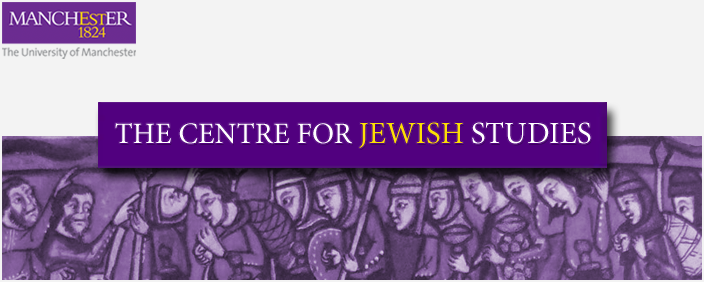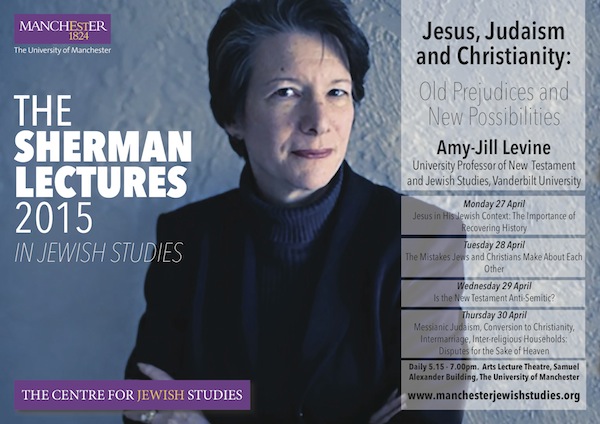Sherman Lectures in Jewish Studies 2015
Jesus, Judaism and Christianity: Old Prejudices and New Possibilities
Prof. Amy-Jill Levine, Vanderbilt University
27-30 April 2015
Lecture 1. Jesus in His Jewish Context: The Importance of Recovering History (Mon 27 April)
Jesus and his first followers were Jews, thoroughly grounded in Jewish Scripture, Jewish ethics and theology, and Jewish hopes. To understand the New Testament materials is thus to recover part of Jewish history. This presentation explores how knowledge of this common history not only became lost, but how Christian interpretation began to bear false witness against Jesus’ Jewish context by characterizing it as legalistic, elitist, obsessed with ritual purity, misogynistic, vengeful, and xenophobic. It then shows how the Gospels themselves can be used to correct these false and noxious stereotypes.
Lecture 2. The Mistakes Jews and Christians Make About Each Other (28 April)
Although both Jews and Christians share a common ancestry in the Scriptures of Israel, the parting of the ways between Synagogue and Church has led to ignorance and stereotyping of the other. This presentation addresses the major misconceptions Christians and Jews have of each other.
Lecture 3. Is the New Testament Anti-Semitic? (29 April)
What does the New Testament say about Jews and Judaism? Is it appropriate to call it "Anti-Semitic" or "Anti-Jewish"? What are the major problematic passages, and what explanations are typically made by pastors, priests, and theologians to defuse them of doing harm? How do anti-Jewish interpretations arise, and what can be done to prevent them?
Lecture 4. Messianic Judaism, Conversion to Christianity, Intermarriage, Inter-religious Households: Disputes for the Sake of Heaven (30 April)
Jews who believe in Jesus of Nazareth as Lord and Savior have, from the first-century to the present, been regarded by the majority Jewish community as at best misguided and, at worse, as apostates and traitors. Jews who marry Christians have been rejected by their family and community; intermarried couples today may struggle with how to raise their children: as Jews, as Christians, as neither… Inter-religious dialogue has been regarded by some Jews as a waste of time, if not as a dangerous pretence designed to encouraged Jews to convert to Christianity. What are the major issues facing Jewish-Christian relations today, and how do we achieve shalom bayit (peace in the household) without sacrificing the particulars of our own traditions on the altar of inter-religious sensitivity? While answers that will satisfy all are not possible, addressing these questions should make us all better informed about twenty-first century Jewish communal issues.
Postgraduate Masterclass. Misunderstanding Judaism means Misunderstanding Jesus.
This addressed the questions: What are the anti-Jewish stereotypes Christian preachers and teachers bring to their reading of the Gospels, how did they develop, and how might they be corrected? (Date: 29 April. Venue: Samuel Alexander A7).
Community Lecture, at the Manchester Jewish Museum
Speaking of the Middle East: Jews and Christians in Dialogue and Dispute (26 April)
The divides within and between Jewish and Christian communities over the Middle East are based on more than contemporary political views; they are also grounded in Scripture, worship, and history. To speak intelligently about the Middle East today, we need to know our respective traditions. This presentation demonstrates how, although Jews and Christians claim to be reading the same books (the Tanakh of the Synagogue and the Old Testament of the Church), we read them with different emphases, in different canonical order, through different translations, and by means of different interpretive strategies. These differences in turn create distinct views of the Land of Israel and so impinge on contemporary debates regarding the political situation in the Middle East today.
The complete series of four lectures is also available via a YouTube playlist.
Archive: Previous Sherman Lectures




